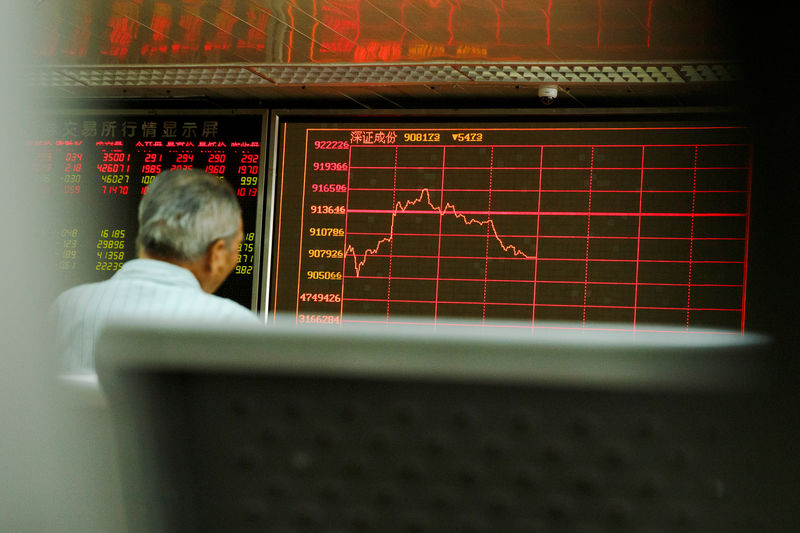By Samuel Shen and Andrew Galbraith
SHANGHAI (Reuters) - Many Chinese investors are piling into products that provide a hedge against a stock market collapse, convinced now that the Sino-U.S. trade war will drag on and, if anything, intensify.
The dramatic shattering of a month-long truce between Beijing and Washington this month has dashed hopes of a trade deal, and these investors are bracing for more bad news, such as further sanctions on Chinese companies, pressure on ratings agencies to downgrade China’s credit rating and even moves to drive up the price of oil.
Wee May Ling, a Singapore-based investment manager at Janus Henderson Investors, said sentiment changed swiftly this week as China's currency fell and Chinese firms stopped purchases of U.S. farm products.
"There is realization that this is going to be protracted, long-drawn out and there is no easy solution because the fight is about intellectual property, technological superiority as well as geopolitical issues," she said.
Xie Donghai, chairman of Shanghai Entropy Asset Management, said the heightened uncertainty would translate into market turbulence.
"We will closely monitor various signals, and further reduce risk exposure," Xie said, adding that hedge fund managers would also adopt strategies that seek to profit from higher volatility.
Investors are positioning for these tail risks in instruments such as options and exchange-traded products that make money if stock markets fall. They are also diverting cash into gold and safe-haven bonds.
Outstanding contracts of put equity options in China - a form of insurance against a drop in Shanghai's SSE50 index (SSE50) - rose to a record 1.5 million this week. Outstanding contracts in China's stock index futures, another risk-hedging tool, hit this year's high.
GRAPHIC: China's put equity options contracts surged amid stock correction - https://tmsnrt.rs/2MOfO92
GRAPHIC: Outstanding stock index futures hit this year's high - https://tmsnrt.rs/2MNTzQw
Chinese bond prices have also jumped to multi-year highs.
In Hong Kong, leveraged and inverse exchange-traded funds, that reward investors when markets collapse, have seen record buying. An inverse fund product managed by CSOP Asset Management (HK:7500) that allows investors to capitalize on the downside of the benchmark Hang Seng index (HSI) saw record turnover and a jump in assets under management (AUM). The risk-off sentiment also drove net inflows into CSOP's money market funds.
"The sanguine mood suddenly turned bearish," said Yuan Yuwei, investment advisor at Olympus Hedge Fund Investments Co, who said he bought stock options to insure against a likely drop in share prices when the trade tensions flared.
TRIGGER COMPETITIVE DEVALUATION
This week, as China allowed its heavily managed currency to fall through a symbolic 7-per-dollar level and Washington accused it of currency manipulation, concerns spread that the trade war could turn into a financial war.
"Currency depreciation ... if not managed properly, could eventually turn into a financial crisis," Yuan said. "Such risks should be taken into consideration," he said.
Liu Haiying, founder of Shanghai-based Haiying Investment, said he fears that China's move to let the yuan depreciate could trigger competitive devaluation among exporting nations. A rush to adopt "beggar thy neighbor" policies would hurt Chinese exporters, trigger fresh concerns about growth, and heap more pressure on the yuan, he said.
To be sure, some of these views are far more bearish than mainstream opinion in China from state-controlled brokerages, long-only fund managers, or official media. They also contrast with the People's Bank of China's repeated claims that China's economy is resilient and the yuan will be stable.
But investors are running for cover. China's benchmark CSI300 stock index (CSI300) has plunged nearly 5% this month, while 10-year treasuries hit a low not seen since January, 2017.
"That partly seems to reflect growing concerns market players are starting to price in on China's political and economic turbulences," said Masanari Takada, cross asset strategist at Nomura Securities in Tokyo, adding those concerns also reflected risks from the political chaos in Hong Kong.
Already there are signs that sharply shrinking risk appetite is driving money away from emerging markets, including China.
Between August 1 and August 6, $6.8 billion in non-resident flows left emerging markets, according to the Institute of International Finance.
China saw more than $2 billion in non-resident equity outflows during this period, with nearly $1 billion in outflows on August 2 alone, following U.S. President Donald Trump's threats of new tariffs.
Ning Zhu, professor of Finance at the Shanghai Advanced Institute of Finance (SAIF) said he's confident in Beijing's ability to manage expectations and avoid a free-fall in the yuan. With strict capital controls in place, foreign currency reserves exceeding $3 trillion, and tools to thwart yuan short-sellers, Zhu doesn't expect panic-selling in the Chinese currency. Nevertheless, Zhu sees long-term downward pressure on the yuan, due to China's frothy asset prices, slowing growth, and the country's massive debt pile.

"There are fewer and fewer drivers for the yuan to appreciate," he said, adding that China should speed up painful reforms to reinvigorate growth to prop up its currency.